In my previous novels Sorcery of Thorns and An Enchantment of Ravens, I shied away from addressing religion in the worldbuilding. I felt that if I did choose to explore faith in a fantasy setting, I would prefer to do so thoughtfully, as a centerpiece of the world—and in a way that allowed me to work the setting’s magic system into the religious hierarchy. I finally had the chance to do this with Vespertine, a book I like to pitch (thankfully not to my publisher’s total horror) as “medieval Venom starring a nun and a ghost.”
Vespertine is about a young woman training to be a nun who awakens an ancient undead spirit bound to a saint’s relic, and wields its staggering destructive power to battle the Dead. Here are five of my favorite books featuring fantasy clergy that inspired me while writing it, their premises combining religion, magic, and death.
Deeplight by Frances Hardinge
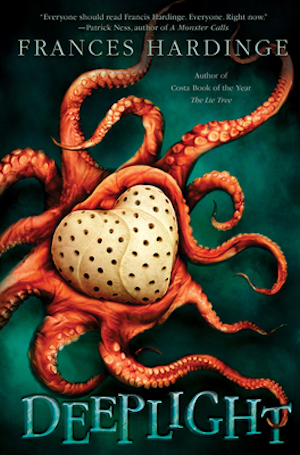
Frances Hardinge is one of my favorite YA authors, whose wonderfully weird, inventive worlds are unlike anything I’ve ever read before. Her most recent novel, Deeplight, takes place among a group of islands called the Myriad, whose surrounding seas were not long ago ruled by the violent and unpredictable gods of the Undersea. Gods like the Glass Cardinal, who resembled a giant man-of-war jellyfish, and emitted terrible screams to harden its skin as it pursued ships across the ocean. Or the Swallower—also known as Devour-All, Father Gullet, Custodian of the Great Purse—a ravenous, gulper eel-like monster whose “great belly was supple as black silk.” Once, these gods were worshipped out of terror; now, many years after they suddenly went into an unexplained frenzy and tore each other to pieces, divers scavenge their colossal bodies for parts. The protagonist, Hark, lands a job in a monastery tending to the troubled monks of the Hidden Lady, who both fear and yearn for the song of their dead goddess.
The Witness for the Dead by Katherine Addison
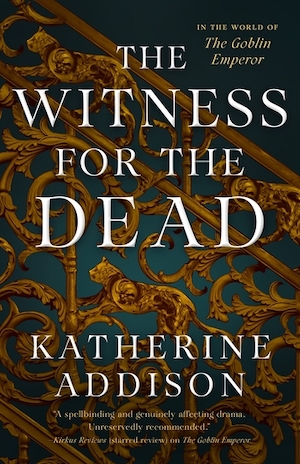
The Witness for the Dead is a companion to one of my all time favorite novels, The Goblin Emperor. It follows Thara Celehar, a compelling and mysterious side character from the first book. As a Priest of Ulis, his discipline allows him to re-live the final moments of the recently deceased, a gift (or sometimes curse) that he uses to investigate their deaths. Related to this talent, he can also subdue flesh-devouring ghouls that occasionally crawl forth from neglected graves. Addison weaves religion and fantasy together into a living, breathing world of immense yet subtle complexity, and depicts Celehar’s dedication to his faith—and its corresponding burdens—with quiet, poignant grace. Despite being elves and goblins, her characters feel more human than most humans.
Penric and Desdemona series by Lois McMaster Bujold
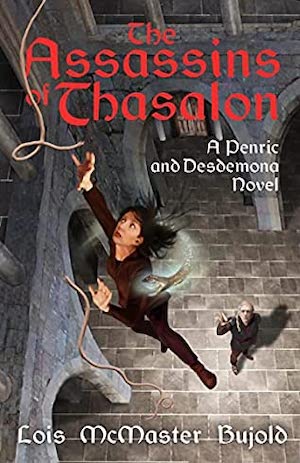
The Penric and Desdemona series takes place in the same world as Bujold’s older, much beloved novels Curse of Chalion and Paladin of Souls. Beginning with Penric’s Demon, these novellas (and one full-length novel), explore the trials of Learned Penric, a sorcerer-priest of the Bastard—god of orphans, bastards, outcasts, and “all things out of season”—whose power originates from the chaos demon inhabiting his body. The demon is herself a fascinating character, her personality a composite of her twelve previous, now-deceased hosts. Bujold has a knack for writing fantasy that is firmly grounded in authentic-feeling religion and politics, and the Quintarian faith is a standout among fictional religions. I can’t wait to catch up with the most recent installment, The Assassins of Thasalon, which just came out this May.
Gideon the Ninth by Tamsyn Muir
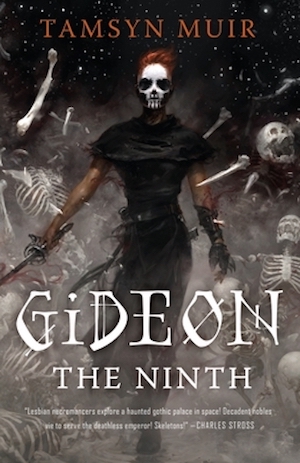
Ah, Gideon the Ninth. Everyone already knows about it, yet I couldn’t create this list without including it—not only because I chose a weirdly niche topic, but also because it’s brilliant and I’ll never be able to stop talking about it. Gideon the Ninth has everything: goth nuns, space necromancy, buff lesbians wielding big swords, and skeletons (so many skeletons). This book is a wild ride from start to finish, with an increasing number of devastating twists whose intensity I could only describe to a friend as a game of literary Russian Roulette happening to my brain. Wonderfully enough, the third book’s title, Nona the Ninth, was revealed just recently—and there’s a fourth installment in the works.
Grave Mercy by Robin LaFevers
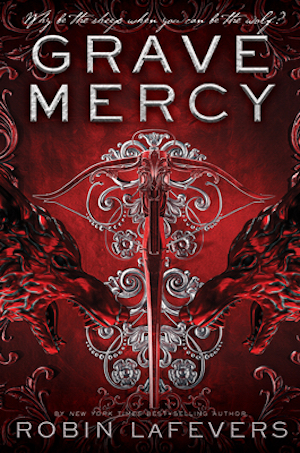
Lastly, it would be remiss of me not to include the ultimate YA death nun series, Grave Mercy by Robin LaFevers. In this world, an alternate medieval Brittany, young women who demonstrate supernatural talents for killing are brought to the convent of St. Mortain to be raised as assassins. There they devote their lives to Saint Mortain—really an old god recast as a saint by Christianity—and prepare to infiltrate Brittany’s court as spies to carry out Saint Mortain’s will behind the scenes. Each book follows a different initiate whose stories intertwine into a larger tapestry. LaFevers masterfully combines a well-researched historical setting, grounded in rich detail, with subtle magical elements that almost feel as though they could be real.
Buy the Book
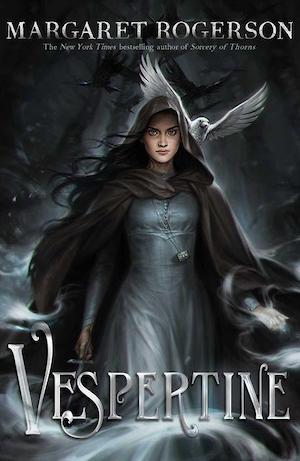

Vespertine
Margaret Rogerson is the author of the New York Times bestsellers An Enchantment of Ravens and Sorcery of Thorns. She has a bachelor’s degree in cultural anthropology from Miami University. When not reading or writing she enjoys sketching, gaming, making pudding, and watching more documentaries than is socially acceptable (according to some). She lives near Cincinnati, Ohio, beside a garden full of hummingbirds and roses.










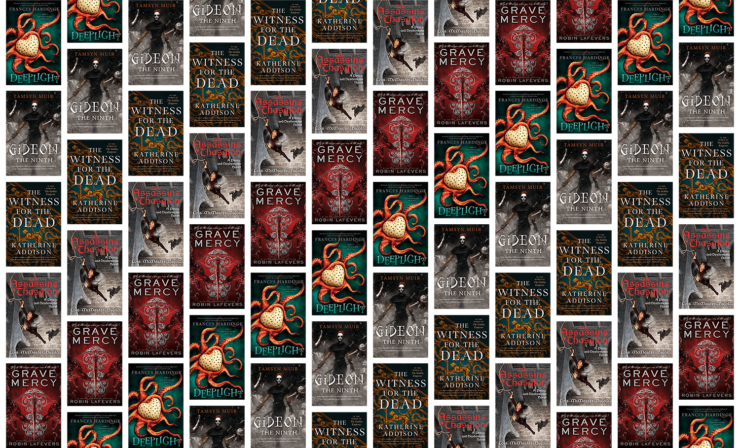
Katherine Kurtz’s Deryni books are a pretty obvious old-school addition to this list.
Nona Grey and the rest of the gang at the Sweet Mercy convent in Mark Lawrence’s Book of the Ancestor trilogy.
I’m currently plowing my way through Jay Kristoff’s Empire of the Vampire which centers around the last of an order of warrior monks/priest
Sisters of the Vast Black by Lina Rather. Sequel coming next February!
Also, one of my favorite Christmas short stories: “Shepherds and Wolves” by Sarah Hoyt, containing my favorite nuns-in-genre.
Penric is THE BEST.
It is quite difficult to find Sci fi/fantasy novels where religion is the subject. There are plenty of protagonists who are clerics or novices or adepts of one faith or another. But it often feels like these are just costumes the heroines wear. They have the same relation to their purported religion as Kung Fu did to Buddhism. Not very much.
Where the religion does play a large part, such as in Dune, it is only the super-serious and strict leaders who feature. Does no one go off for a laugh and a cup of tea? You cannot imagine the Bene Geserit having a girl’s night out.
Terry Pratchett was a mold breaker in this regard.
I’m quite fond of Father Forthill in the Butcher’s Dresden series. He mixes faith plus practicality and being an overall good guy. Bonus points for Dresden’s Michael Carpenter, who even if not a priest is pretty much a saint in action.
Dan Simmons’ Hyperion books.
Heinlein’s Revolt in 2100
Miller’s Canticle for Liebowitz
Charles Stross Golden Promise Ministries in the Laundry series
Mary Doria Russell’s The Sparrow shouldn’t be overlooked!
James Blish’s A Case of Conscience
Arthur C Clarke’s “The Star”
I don’t know all these books, but two I do.
I loved Deeplight. It had a well developed religion and great characters. I would love to see more stories in this world, both before and after the death of the gods.
I also loved Gideon the Ninth. Weird, spooky, frightening in places, with hope and love peeking out. Unfortunately, I haven’t been able to get more than fifty pages into the sequel, Harrow the Ninth. A book written in the second person just doesn’t work for me. I’ve been told it isn’t entirely in 2nd person so I may give it another shot.
The Goblin Emperor was another great book. I haven’t read Witness for the Dead yet, but it is sitting next to me in my to-be-read list.
I’ve only read a couple of the Penric and Desdemona stories and only one of the Chalion books. I liked then, I just haven’t gotten back to them.
The Illuminatus Trilogy. #AllHailDiscordia
I can’t get enough of the highly competent lawyer priests of the White Rat in T. Kingfisher’s evolving universe, and the gloriously defective paladins of all the other gods & saints.
Gene Wolfe – The Book of the Long Sun.
Alice Degan’s From All False Doctrine.
And Becky Chambers’ A Psalm for the Wild-Built in her new “Monk and Robot” series.
And please, please, don’t read The Sparrow unless you have a copy of the sequel Children of God in your hand before you finish the first volume…
Ursula Le Guin has some memorable and complex examples. The Tombs of Atuan is an obvious one with its death cult priestesses and the high priestess who moves through a painful confrontation with her religion. There’s also the non-supernatural sort-of-religion of the Kesh people in Always Coming Home, which has various dedicated practitioners and teachers, though ‘clergy’ would be too hierarchical a term; one of my favourite stories in the collection is to do with a woman who has to learn to live with and effectively re-tell the visions she is prone to, as part of a community used to managing such gifts.
Tamora Pierce’s Circle series centres around a religious community, another largely non-supernatural religion focused on the earth, craft, and magical practice. Lots of the characters are or become dedicates.
In H. Beam Piper’s Paratime story Temple Trouble, agents of Transtemporal Mining set up temples to a local god, Yat-Zar. Most of the other deities on that timeline had real, home-grown priests.
@15 Yes. I actually read Children of God first, and then went back (I bumped into COG first – it wasn’t a deliberate choice).
I concur with @@@@@I Can’t Think of an Alias. The Deryni books (esp. the Camber books) are all about the clergy and the trappings of religion.
I think we can also safely mention the Dune books in this. Even if the Bene Gesserit create religious legends for pragmatic purposes, clergy are central to the series in one way or another.
@1 – came here specifically to say that. Also closely related Judith Tarr’s Hound and Falcon trilogy.
Possibly tenuously being written by a priest about a fictional priest playing a god – Andrew M Greeley – God Game.
https://en.wikipedia.org/wiki/God_Game_(novel)
The Obsidian and Blood trilogy by Aliette de Bodard follows a cleric of the god of Death through Tenochtitlan and his dealings with gods, spirits, and the dead. If you didn’t think you wanted a fantasy noir murder mystery dripping in Aztec imagery, you absolutely do. If you’re interested enough to read this list-icle, you will enjoy the books.
This list really should include David Weber’s Safehold series, which is built around how a religious structure was constituted to keep all of humanity under control and unable to develop technology. It’s a very even handed portrayal of how religion can be used for good and evil. Weber threads religion through the Honor Harrington series as well, mainly using Grayson, a planet newly reconnected to the galactic society, as the example of the religiously devout in a far more secular galaxy. Neither series is preachy about its religious inclusion, and the reader isn’t encouraged to believe in anything…they are good examinations of how religion fits into human society.
Lois McMaster Bujold’s Chalion books has my favorite religion and magical system I’ve ever read. I strongly concur with everyone who mentioned her Penric books here, and really if you haven’t read Curse of Chalion and its highly awarded sequels you’re just missing out.
I also recently discovered T. Kingfisher’s books with the Temple of the White Rat, and I love them so much as well.
The emberverse by SM Sterling. While not technically centered around clergy, I’d argue it’s even better for it. The books feature Wiccan, Christian, Norse and quasi-Cthulian religions and the “active” presence of miracles/intervention by said “Deities” through their mortal champions and adherents. Given our somewhat secular world, it’s a nice change to see an author take religion seriously … and literally (literally).
Great article and comment thread. Thank you all.
It would be a mistake to overlook sprawling David Weber’s Safehold series on this topic. Packed full of religious connection, displays the full cultural and political impact. Really satisfying storytelling.
@17: Also Piper’s _Lord Kalvan of Otherwhen_, featuring the priests of a deity (Styphon, IIRC?) maintaining temporal power by asserting a divine monopoly on gunpowder manufacture and sales…
Hrathen from Brandon Sanderson’s Elantris should definitely be here. A devout warrior-priest of a very militant religion, who also happens to be possibly the most genuinely-moral person of that faith, and is not only a viewpoint character, but also FAR more badass than is expected of him.
I am so glad to have found this and grateful to everyone for sharing. The Sparrow is one of my favorite books and the best written books ever, if not exactly a pleasure per se. I have never loved a group of people so much. I have to confess I haven’t yet read COG because I was such a wreck after Sparrow. But I have it and will. Canticle for Leibowitz remains one.of the formative reads of my life. I’m shocked it hasn’t ever been filmed. Relevant Titles not already mentioned don’t come to mind. Now pursuing those mentioned I haven’t read.
The Craft sequence by Max Gladstone is based on the acts of clergy after the end of the God Wars.
Black Water Sister Zen Cho: Indonesian religions
The beautiful The Bird King by G. Willow Wilson: the conflict between Christianity and Islam in late medieval Spain.
I’m surprised no one’s included Randall Garrett’s Lord Darcy (one novel, Too Many Magicians, and two short story collections). Michael Kurland also wrote a couple of sequels. All are worth pursuing; the Kurlands are nearly as good as the originals.
I’m surprised no one mentioned Heinlein’s Stranger in a Strange Land. That’s all about religion, including the battle between the Dionysian Fosterites and the Apollonian Church of all Worlds. Having met Otter Zell at a convention once, that book had a serious IRL element in response.
Oh..several of Ted Chiang’s short stories:
Omphalos
Hell is the absence of god
I’m sure others do too..the one in which a cubic mile of Jerusalem is removed…
Roger Zelazny’s Possibly Proper Death Litany from “Creatures of Light and Darkness”. Even more, the entire conceit behind “Lord of Light”. Come to think of it, a lot of Zelazny’s characters are gods … maybe …
“His followers called him Mahasamatman and said he was a god. He preferred to drop the Maha- and the -atman, however, and called himself Sam. He never claimed to be a god, but then he never claimed not to be a god.”
Terry Pratchett’s book “Small Gods” discusses religion in many forms. “Around the god there forms a shell of prayers and ceremonies and buildings and priests and authority, until at last the god dies. And this may not be noticed.”
Jo Walton’s Lifelode comes to mind.
I like the religion in The Lies of Locke Lamora by Scott Lynch which has a very interesting thieves religion.
I agree with many of the article’s and comments’ recommendations (and have a new list of books to add to my reading list), but I want strenuously to add a book.
One of the most thoughtful books centered on clerics within a monotheistic church which deals with church politics, doctrines, heresies, and the church militant versus other religions is Small Gods by Terry Pratchett. It’s a serious book with humor and well worth reading.
On the other hand, his ancient Egyptian religion romp, Pyramids, is a very humorous book with touches of seriousness.
Most of David Eddings’s books have priests of one sort or another.
(Of course, the gods themselves tend to turn up as well…)
Neal Stephenson: Anathem. Certainly deal with clergy – although here the clergy are scientists, locked away, most of the time, from society and their families. And the more “you” – as one of the avout/scholars ponder/think the more separated you are from the outside/”real” world. Long – sometimes they feel interminable – discussions about theology, philosophy, maths comprise much of the book until the young protagonist sets out of the cloister to save at least one of the many worlds in the multiverse. Listening to Anathem as an audiobook was probably the wrong way to do it.
James Morrow: Towing Jehovah – god, dead, has fallen into the ocean and is being towed by a mega-supertanker to his final resting place – ideally before being damaged beyond recognition in the process.
The first Mistborn Trilogy by Brandon Sanderson (I’ve not read the second yet) involves religions both living and dead, and the question of truth in them.
A Memory Called Empire by Martine has a blood-centered religion (which along with the naming conventions feel very Aztec-ish to me), and its sequel continues along those lines.
Salvatore’s Cleric Quintet.
Fritz Leiber’s Fafhrd and the Grey Mouser stories have a plethora of interesting religions. Our heroes protagonists serve some, but worship none. At one point, Fafhrd becomes a votary of Issik of the Jug (as opposed to Jugged Issik, and several other similarly named gods). Issik is a small-time god, not much worshiped, but Fafhrd manages to make him popular. (until lured away by the Gray Mouser and drink)
Aliette de Bodard: Servant of the Underworld. The viewpoint character is a minor priest saddled with investigating a murder for which his warrior brother looks like the perp — in a society that looks Aztec (from what little I know of the culture). Unfortunately for him, the gods are both real and at odds with each other. #1 of “Obsidian and Blood” triptych; I haven’t read the others to see where they go or who features.
The Belisarius books by Eric Flint and David Drake.
There are Orthodox priests and monks in Constantinople,
Monophysite priests and monks in Alexandria,
Hordes of priests and monks, of hordes of deities, in India.
Just a quick note to mention Victoria Strauss’s excellent “Way of Ârata” duology. The Burning Land and The Awakened City feature fantasy clergy (one of the main characters is a sorcerer-priest, as the description calls him) and religion and faith are central themes. I can’t recommend this pair of books highly enough! :-)
“There are plenty of protagonists who are clerics or novices or adepts of one faith or another. But it over feels like these are just costumes the heroines wear”
So true, and that does seem to happen in a lot of books. Perhaps it’s just an insidious carry-over from D&D, where it seems being religious is pretty much just an excuse to be a badass who can cast cool spells and has no real core beliefs. However, as a counter to that, here are three fictional people with genuine faith.
Dion from the book Spiderlight: cleric of possibly the most D&D-y party that ever crawled a dungeon, who nevertheless has genuine religious quandaries. Her faith and her doubts about it are developed to the point where you can understand and empathise with her genuine horror when she finds out about the real history of her world and its religion.
Then we have Gwyn, monk and priest of the book Hanes Gwyn whose Christian belief defines every action he takes, driving him to decisions that cause him and others immense pain. His faith is the driving force of the entire story, and it would be impossible to imagine the book, or his character, without it.
Finally (and I’m surprised no-one has mentioned him so far) we have Damien Vryce: Warrior Priest of the Church of Human Unification on Erna. Throughout all three Coldfire books, one of the most interesting threads of the story is seeing him grapple with the morality of working with someone who is simultaneously the foremost prophet of his own church and also a walking personification of evil and sin, as his church defines them.